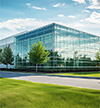The Area Development Frontline series offers insight into successful, innovative strategies taken by businesses; intelligence on locations that are deploying winning policies that attract investment and talent; and reports on industry trends that affect and shape the global business climate now and in the future.
The recession took its toll on communities around the United States. But in the Rust Belt - spanning western upstate New York to eastern Illinois - former manufacturing cities such as Youngstown, Ohio, and Detroit became buzzwords of economic deterioration.
"The rate of the economy declining was really shocking," says Angie Schmitt, a founding editor of Rust Wire, a blog that covers Rust Belt communities.
But today, new and innovative organizations are helping bring back the region's economy.
nxtARROW
Buffalo, New York, located on the eastern shores of Lake Erie, took its share of hard knocks during the recession. But some residents see the downturn's negative effects as opportunities.
"When [outsiders] think of the Rust Belt, they think of rust, snow, blight. They don't have any idea of the half-full side of the glass," says John Howell, president of nxtARROW, a privately-funded Buffalo business incubator.
nxtARROW - whose name riffs on the iconic, Buffalo-based former carmaker Pierce-Arrow - does what many incubators do not: it funds all expenses for startups that agree to locate in the city for one full year. Local business-to-business providers, from marketing agencies to accountants to website developers, offer their services pro bono or via deferred payments to participants in the new program, which was unveiled in February.
Startups that participate in nxtARROW receive not only free services, but mentoring, coaching, connections, and introductions to potential business partners, and proximity to Buffalo's more than 26 area colleges and universities.
While startups can locate anywhere due to the ease of high-speed Internet connections, Howell rattles off a slew of reasons for nascent companies to locate in Buffalo.
"Our most valuable assets right now are a lot of available space and low overhead to launch a business," Howell, a Buffalo native, says. He also cites the city's many college students and graduates, university labs, and high quality of life. But the community's commitment to local businesses is especially attractive to new companies.
"People are very committed to the city's well being," Howell says. "They will get behind any local business that looks like it's worth saving and do their best to make it work."
That community spirit drew former Boston resident Michelle Maria Nicholas to nxtARROW in February. Nicholas founded WorkSmart eBusiness Solutions, a virtual administrative management consulting firm. She's now planning to form an LLC for the business, increase advertising, and have 10 paying clients by the end of the year. While Buffalo did not initially impress her, she now sees the city's potential.
"Buffalo is a very deceptive city, because on outside looking in, you won't come here," Nicholas says. "Once you're on the inside, you're amazed at what you see."
TechBelt
The TechBelt Initiative aims to bring advanced technologies in energy and the life sciences to an area spanning Pittsburgh; Youngstown, Ohio; and Cleveland. Collaborators include some of the region's leading institutions and incubators: Carnegie Mellon University, the Cleveland Clinic, NorTech, Team Neo, and the Youngstown Business Incubator.
Unlike comparable organizations, TechBelt is not legally incorporated. It pools its partners resources for a collaborative effort to benefit the entire region. "The last thing we need is another organization," says DeWitt Peart, president of the Pittsburgh Regional Alliance and a TechBelt leader. "Each of the participants who are involved have their own mission and objectives where there are opportunities to collaborate."
Those participants are counting on the region's existing economic strength to propel it forward. The area's colleges and universities produce graduates prepared for energy and life science jobs, and its existing manufacturing infrastructure facilitates retooling for new technologies.
Peart sees signs of economic resurgence in these sectors. The region's energy assets include shale gas exploration in the Marcellus Shale and the industries that support it, and two federal labs (NASA Glenn Research Center and National Energy Technology Laboratory). Healthcare is steadily growing, too: The University of Pittsburgh Medical Center is that area's largest private employer.
TechBelt's primary goal is to attract more federal dollars towards research supporting these sectors. It has already won a $400,000 appropriation from Congressmen Tim Ryan (D-Ohio) and Jason Altmire (D-Pennsylvania). The Cleveland Foundation, Richard King Mellon Foundation, and GAR Foundation have also contributed grants.
Long term, Peart says TechBelt seeks federal regulations that ease immigration for highly skilled workers, improve trade with Canada, and support a clear energy policy that includes clean coal.


